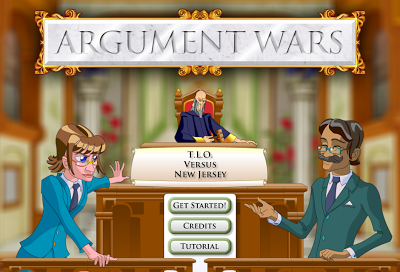and Education
Week - GlassLab Opens Opportunity for Education-Game Makers
In summer 2012, the Bill & Melinda Gates
Foundation, in cooperation with the MacArthur Foundation, made a significant
investment to establish the Games Learning and Assessment Lab (GlassLab), which includes top game
developers, learning scientists, assessment designers and researchers from
multiple fields and disciplines, housed at Electronic Arts and Co-Lab (Zynga).
The program was divided into two teams to
mitigate conflict of interest and guarantee independent validation of
assessments developed by the program.
The programming and development group (GlassLab)
was tasked to design and develop state-of-the-art, game-based formative
assessments. These assessments are being developed in response to the climate
of student disengagement that currently exists in many classrooms. By
leveraging the popularity of digital video games and by applying Evidence
Centered Design (ECD), the game-based formative assessments address the needs
of both students and teachers for reliable and valid real-time actionable data
within a motivating learning environment. This work is being conducted by the
Institute of Play, the Educational Testing Service (ETS), Pearson, Inc., Analytics
and Adaptive Learning, Electronic Arts (EA), and the Entertainment Software
Association (ESA).
Concurrently, the Foundation tasked the SRI-led research team (GlassLab-Research)
to independently conduct research on the qualities, features, inferential
validity, reliability, and effectiveness of the assessments that were embedded
within the GlassLab game products. The GlassLab-Research work is being
conducted by experts in assessment, learning sciences, science education, and
learning technology at SRI with the support of external consultants.
Last month GlassLab announced that it is
moving to provide free assessment and analytics technology to third-party
digital learning game developers, including an initial cohort of five groups
beginning this fall.
The goal is to help those developers more
efficiently capture the torrents of data generated from student game play,
process that information for signs that students are mastering academic
standards, and display the results to students, teachers, and others via
easy-to-use dashboards.
Over 100 groups—including research organizations,
small startups, established commercial players, and more—submitted applications
to be part of the initial cohort of developers with whom GlassLab will
partner, according to Executive Director Jessica Lindl.
Among other things, the groups will receive
computer code that integrates into their existing games to help collect data
and access to an Assessment Engine that processes that data against key
academic standards.
Lindl said that GlassLab assessment
experts from Pearson and ETS will also work directly with the third-party
developers to figure out how the data generated by their games connect to academic
standards.
The model for the new partnerships will be a
recently completed pilot effort involving GlassLab and Washington-based iCivics,
a nonprofit that develops web-based learning games such as Argument Wars,
meant to help students learn the skills of evidence-based persuasive
argumentation, which happens to be a key piece of the new Common Core State
Standards (please find also Serious Games Boost Civic Education In The Classroom and iCivics 2013 Report: Serious Games Reaching 35,000 Educators Across 9,000 Schools).
Through the partnership with GlassLab, iCivics
has been able to generate a much more robust portrait than was previously
possible of what students are learning in Argument Wars.
In addition to knowing if a student won the
game and was engaged while playing, iCivics can now see a portrait of
the reasoning strategies and other mental processes used by the student. That
information is aligned to academic standards and fed back to teachers to help
them know what type of instructional help each student needs next.
"Because GlassLab has its own
argumentation game (Mars Generation One: Argubot Academy, currently in
beta-testing and expected to be publicly released this August), researchers
were able to do sophisticated reliability and validity testing”, Lindl said
(Please find also ELA Serious Games Infused With Stealth STEM Content).
Mars Generation One: Argubot Academy, offers an example of how that technology works.
In the game, players—typically middle school
students—find themselves in a settlement on Mars where disputes are resolved
through formal arguments. To succeed, players must search for evidence that can
support the claims they are trying to make. They also must critique others'
arguments, determining whether the evidence presented supports the claim
effectively. Players advance by winning argument "duels" against
opponents.
“Over the course of a complete 90-minute cycle
of game play, players might engage in eight or more such duels and be asked to
critique 20 claim-evidence pairings”, said Seth M. Corrigan, a research
scientist for learning analytics with GlassLab.
The tools that the group has developed are
used to gather, organize, and analyze the resulting data to create
a model of what students know and have learned. First, the types of telemetry data generated
by players' clicks and other in-game decisions deemed relevant through
extensive analysis are located and stored in secure, custom-built databases.
Then, that information is fed into an "assessment engine" that
determines what students' game-play patterns reveal about their mastery of
three specific common-core standards related to argumentation and reading
informational texts. Finally, those results are reported back to students,
teachers, parents, and others by digital dashboards.
As part of its new effort, GlassLab is
also preparing to introduce a website that teachers will be able to access
directly to find games and related instructional materials, and monitor
students' progress.



